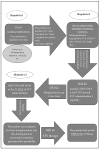COVID-19 as Another Trigger for HBV Reactivation: Clinical Case and Review of Literature
- PMID: 35890060
- PMCID: PMC9318431
- DOI: 10.3390/pathogens11070816
COVID-19 as Another Trigger for HBV Reactivation: Clinical Case and Review of Literature
Abstract
Universal hepatitis B virus (HBV) vaccination has been applied for years in most countries, but HBV infection remains an unresolved public health problem worldwide, with over one-third of the world's population infected during their lifetime and approximately 248 million hepatitis B surface antigen (HBsAg) chronic carriers. HBV infection may reactivate with symptomatic and sometimes life-threatening clinical manifestations due to a reduction in the immune response of various origins, due to chemotherapy or immunosuppressive therapy, treatments increasingly practiced worldwide. SARS-CoV-2 and its COVID-19 associated disease have introduced new chances for HBV reactivation due to the use of dexamethasone and tocilizumab to counteract the cytokine storm. This could and should be prevented by accurate screening of HBV serologic markers and adequate pharmacologic prophylaxis. This article describes the case of a patient with COVID-19 who developed HBV reactivation and died of liver failure and analyzes published data on this setting to provide useful information to physicians who manage these patients during the SARS-CoV-2 pandemic.
Keywords: COVID-19; Hepatitis B virus; SARS-CoV-2; immunosuppression therapy; prevention; reactivation.
Conflict of interest statement
The authors declare that they have no conflicts of interest.
Figures
References
Publication types
LinkOut - more resources
Full Text Sources
Miscellaneous


